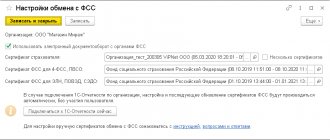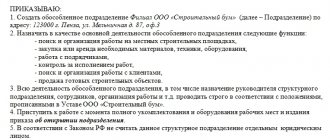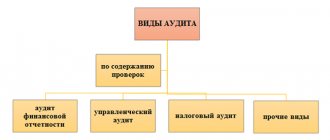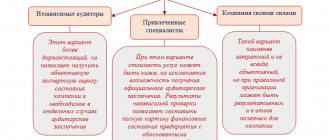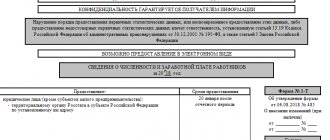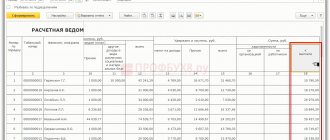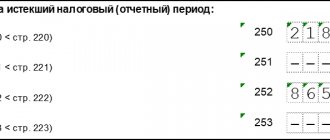When the management of an enterprise needs to check documentation related to its activities for accuracy and compliance with the requirements specified in the legislation, an independent verification is carried out - an audit. For some companies, this is a mandatory procedure that must be completed annually.
Auditing activities in the Russian Federation are regulated by the Federal Law of December 30, 2008. No. 307 (law “On auditing activities”).
Who should undergo a mandatory audit ?
Who is exempt from the mandatory accounting audit for 2020
Federal Law No. 476 dated December 29, 2020 changed the criteria for conducting a mandatory audit of financial statements. The new rules came into force on January 1, 2022.
Until 2022, a mandatory audit was carried out in cases where the revenue of an organization (with the exception of government bodies, state and municipal institutions, state and municipal unitary enterprises, agricultural cooperatives) for the previous reporting year exceeded 400 million rubles or the amount of assets exceeded 60 million rubles (according to the law on auditing activities dated December 30, 2008 No. 307-FZ).
But the law on the development of small and medium-sized businesses (No. 209-FZ dated July 24, 2007) defines small businesses as organizations with an income for the previous calendar year of no more than 800 million rubles.
In connection with this Law No. 476, the financial criteria for mandatory audit for revenue were increased from 400 to 800 million rubles, and for the amount of balance sheet assets - from 60 to 400 million rubles. Thus, small businesses are exempt from conducting mandatory audits of financial statements starting in 2022.
Cheat sheet on the article from the editors of BUKH.1S for those who do not have time
- Since 2022, the criteria for conducting a mandatory audit of financial statements have changed.
- An audit is now mandatory for organizations that received income of more than 800 million rubles in the year preceding the reporting year. or having, as of the end of the year preceding the reporting year, assets worth more than 400 million rubles.
- Small businesses are exempt from mandatory audits of financial statements starting in 2022.
- The Ministry of Finance annually publishes a list of cases of mandatory audit of accounting (financial) statements. The list will help determine whether an organization should conduct an audit of financial statements for 2022.
- The audit report for those who are subject to a mandatory audit must be submitted to the tax authority and to the Unified Federal Register of Information on the Facts of the Activities of Legal Entities.
- For failure to provide information about the audit, the organization and its officials may be fined.
Which companies must undergo an audit?
An audit of financial statements can be mandatory and proactive. The first can only be external, that is, carried out by independent experts from firms specializing in auditing, or by individual auditors who are not employees of the audited company.
Firms that must be subject to the mandatory audit procedure are named in the Federal Law dated December 30, 2008. No. 307 (law “On auditing activities”). These enterprises include:
- companies with the legal form of JSC;
- companies whose securities are admitted to organized trading;
- firms with a certain type of activity (this includes credit, clearing, insurance, companies participating in the securities market, microfinance, self-regulatory organizations, cooperatives, gambling organizers, etc.);
- companies that have revenue over 400 million rubles or assets over 60 million rubles (for the year preceding the reporting year), etc.
A detailed list can be seen in Art. 5 Federal Law No. 307 “On auditing activities”.
An initiative audit can be carried out in certain cases, such as: bank lending, the need to participate in tenders, the desire of company managers to reduce tax risks, checking the qualifications of the accounting department, preparing a report for a potential investor.
Who should conduct a mandatory accounting audit for 2020
The Ministry of Finance has published a list of cases of mandatory audit of accounting (financial) statements for 2022.
This list is published by the ministry every year. It specifies the legislative basis for conducting a statutory audit, the type of reporting to be audited, and who has the right to conduct an audit in each case.
The list contains 75 cases of mandatory audit.
The essence of the audit of financial statements
Financial reporting is a concentrated set of indicators that characterize the work of a specific business entity for a certain period of time.
On its basis, various types of economic and financial analysis are carried out, and management decisions are made. The more reliable the reporting information, the more useful it is for users and the higher the degree of effectiveness of decisions made on its basis. Read about algorithms for using reporting data for analysis in the following materials:
- “Methodology for analyzing the balance sheet of an enterprise”;
- “Features of analysis of consolidated statements”.
To ensure that users of reporting do not have doubts about the quality of the information presented in the reporting, and that its compilers are not tempted to modify this data for their own purposes, an independent assessment of the reliability of financial reporting is required.
This task can be achieved through an audit - a set of special verification activities, as a result of which independent specialists express in the prescribed form an opinion on the degree of reliability of the data presented in the reporting.
The audit makes it possible to:
- the audited entity can see its accounting from the inside through the eyes of professional specialists, receive the necessary recommendations and correct identified distortions, eliminate errors;
- management and owners of the audited entity - evaluate the work of the accounting personnel and the company as a whole and make appropriate organizational conclusions;
- other users of reporting - to receive a qualified professional assessment of the reliability of reporting, on the basis of which effective decisions can be made.
For information about what types of decisions of owners may depend on reporting data, read the article “Decision on payment of dividends to an LLC - sample and order .
How to check whether an organization is subject to a mandatory audit of accounting records for 2022
In 2022 (i.e., starting with reporting for 2022), a mandatory audit is carried out for organizations:
- received income of more than 800 million rubles in the year preceding the reporting year. or having, as of the end of the year preceding the reporting year, assets worth more than 400 million rubles;
- whose securities are admitted to organized trading;
- who are professional participants in the securities market or credit history bureaus;
- being funds with the receipt of property (including cash) for the year preceding the reporting year, more than 3 million rubles. (except for state extra-budgetary funds, specialized endowment management organizations and international funds);
- other organizations in accordance with federal laws (joint stock companies, investment funds, clearing, credit, insurance, microfinance, etc.).
Note!
To determine whether an organization must conduct a mandatory accounting audit for 2022, income data must be looked at for 2019, as the year preceding the reporting year 2022.
Organizations that are not subject to mandatory audit under the new rules do not need to undergo it in relation to the annual accounting (financial) statements for 2022.
There is an exception: if an organization was subject to a mandatory audit requirement in 2022 and began an audit for 2020 before January 1, 2022, then such audit must be completed. And the changes adopted by Federal Law No. 476 dated December 29, 2020 will be effective for these organizations from reporting for 2021.
Survey
Mandatory audit
- Is your organization subject to mandatory audit in 2021?
No, we are a small business. 87 (69%) Yes, it is subject. 27 (21%) I have no idea, I need to find out! 13 (10%)
Thank you for participating in the survey! Every opinion is very important to us!
Responsibility for failure to carry out
The business entities listed earlier must undergo an audit of their financial statements every year, and also send the conclusion to the statistical authorities. Submission of the report must be carried out together with the submission of reports. If you cannot send the document on time, you can submit it within 10 days from the date of issue, but no later than December 31 of the year following the reporting year. This is stated in the Federal Law of December 6, 2011 No. 402 (the Law “On Accounting”), namely in its 2nd article.
In addition, within 3 working days from the date of issue of the conclusion, the company is obliged to enter information about the results of the audit into the Unified Federal Register on the facts of the activities of legal entities.
The fact of failure to conduct an audit does not entail punishment. Administrative liability occurs in the cases described below. Punishment is possible only for those organizations that are required to undergo a mandatory audit of their financial statements.
| Initiator of the fine | Cause | Article | Fine |
| Federal Tax Service | During an on-site inspection, it was discovered that an audit report was missing for the required storage period (from 5 years). | Part 1. Art. 15.11 Code of Administrative Offenses of the Russian Federation | From 5 to 10 thousand rubles for officials. |
| Rosstat | If an audit report has not been provided to this body within the required period. | 19.7 Code of Administrative Offenses of the Russian Federation | From 300 to 500 rubles for officials and from 3 thousand to 5 thousand rubles for legal entities. |
| Bank of Russia | The audit report was not posted on the JSC website within the required period. | Part 2 art. 15.19 Code of Administrative Offenses of the Russian Federation | From 30 thousand to 50 thousand rubles or suspension from work for 1-2 years for officials. For legal entities - from 700 thousand to 1 million rubles. |
The amount of the fine may be reduced by court decision if there were any exceptional circumstances that resulted in an administrative offense.
Independence and professional skepticism in the audit of financial statements
Compliance with the principle of independence is given particular importance in the audit environment. This aspect is covered both in separate articles of a number of regulatory legal acts and documents entirely devoted to issues of auditor independence, for example:
- Art. 8 of Law No. 307-FZ;
- rules for the independence of auditors and audit organizations, approved by the Auditing Council (minutes No. 6 dated September 20, 2012);
- codes of ethics and independence of auditors of the Russian Federation and individual self-regulatory organizations (SROs) of auditors;
- sections of internal auditing standards.
If there is a threat to independence and appropriate precautions to eliminate them cannot be taken (or do not exist), the auditor is required to refuse the engagement (stop performing it).
The auditor is required to:
- be independent of the audited entity during the audit and the period covered by the audited statements;
- reflect your findings on compliance with independence in working documents;
- carry out other actions based on the requirements established by the legal acts.
The concept of “professional skepticism” refers to the category of special audit terms and consists of the following:
- the auditor is obliged to critically evaluate the weight of evidence obtained during the audit;
- Audit evidence that contradicts information obtained from other sources (any documents or management statements) or casts doubt on the reliability of such documents and statements is subject to careful examination;
- When planning audit procedures and preparing conclusions based on audit results, it is important:
- do not ignore suspicious circumstances;
- do not make unjustified generalizations;
- do not use erroneous assumptions when determining the nature, timing and scope of audit procedures (including when assessing audit results).
During the audit process:
- the auditor should not assume that the management of the audited entity is dishonest, but cannot evaluate it as unconditionally honest;
- Management statements (written and oral) are not a substitute for obtaining sufficient appropriate audit evidence.
It is important for the management of the audited entity, as well as specialists who directly provide auditors with the necessary information (preparing and providing documents, drawing up explanations and responses to requests), to correctly understand the content of the terms “independence” and “professional skepticism” - this will allow them to adequately respond to the procedures carried out by the auditor and the clarifications requested by him during the audit of financial statements.
The main objectives of the audit of financial statements
To achieve the main goal of the audit described in the first section of our material, it is important to solve the following tasks:
- during an audit, obtain independent and reliable initial information about the financial activities of the audited entity;
- based on the obtained audit evidence, form conclusions about the reliability of the financial statements of the audited entity;
- state in a separate document the identified comments and recommendations for their correction;
- formulate an audit report that corresponds to the actual level of reliability of the audited statements, taking into account regulatory requirements and that is understandable to users;
- other tasks (specified in the contract and audit assignment).
Read about the objectives of other control measures in the material “Financial control: concept, meaning and objectives” .
Registration of audit results
Registration of the results of an audit of financial statements is a multi-operation procedure, including:
- preparation of a set of working documents for the auditor for the audit and other necessary papers (in accordance with the requirements of federal and internal auditing standards and rules);
- formulating the text of the audit report and written information to the management and owners of the audited entity based on the audit results;
The auditor's working documents are stored in the audit company and are subject to quality control by the SRO and Rosfinnadzor (if the audit was carried out in relation to the reporting of particularly significant business entities).
Providing management and owners with written information containing the auditor’s comments and recommendations is a separate procedure regulated by a special auditing standard, which outlines the requirements for:
- the auditor's identification of the appropriate recipients of such information;
- content of the information;
- timing and form of its presentation.
The auditor's report (AZ) is a final and general document drawn up in accordance with the Federal Auditing Standard (FSAD) 1/2010 “Audit report on accounting (financial) statements and forming an opinion on their reliability” (approved by order of the Ministry of Finance of the Russian Federation dated May 20, 2010 No. 46n), defining the requirements:
- to the form and content of AZ;
- algorithms for signing and presenting conclusions;
- scheme for expressing an opinion on the reliability of accounting (financial) statements.
To find out whether there is interaction between auditors and tax authorities regarding audit data, read the material “Tax authorities will have access to audit data.”

